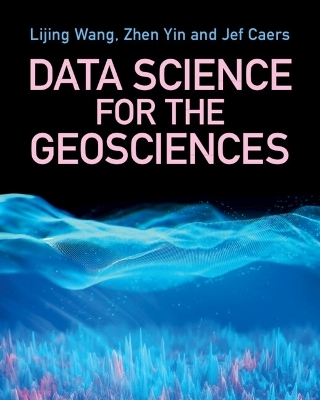
Data Science for the Geosciences
Cambridge University Press (Verlag)
978-1-009-20140-7 (ISBN)
Data Science for the Geosciences provides students and instructors with the statistical and machine learning foundations to address Earth science questions using real-world case studies in natural hazards, climate change, environmental contamination and Earth resources. It focuses on techniques that address common characteristics of geoscientific data, including extremes, multivariate, compositional, geospatial and space-time methods. Step-by-step instructions are provided, enabling readers to easily follow the protocols for each method, solve their geoscientific problems and make interpretations. With an emphasis on intuitive reasoning throughout, students are encouraged to develop their understanding without the need for complex mathematics, making this the perfect text for those with limited mathematical or coding experience. Students can test their skills with homework exercises that focus on data scientific analysis, modeling, and prediction problems, and through the use of supplemental Python notebooks that can be applied to real datasets worldwide.
Dr. Lijing Wang is a Postdoctoral Research Fellow in the Earth and Environmental Sciences Area at Lawrence Berkeley National Laboratory. She earned her Ph.D. from the Department of Earth and Planetary Sciences at Stanford University. Her research centers on integrating geoscientific data, such as geophysical surveys and in-situ hydrological measurements, with hydrological modeling to develop informed solutions for water resource management. She was a Stanford Data Science Scholar and had been a teaching assistant for the Data Science for Geosciences course at Stanford for over three years. She has received the Harriet Benson Fellowship from Stanford for her exceptional research accomplishments. Dr. Zhen Yin is a research scientist and co-founder of the Stanford Mineral-X (https://mineralx.stanford.edu/) at Stanford Doerr School of Sustainability. His research developments in data science have been implemented in various subjects, including Antarctica topographic modeling, critical mineral explorations in Asia/North America/Africa, and North Sea projects. He was previously a Research Associate at the Edinburgh Time-Lapse Project in Scotland, leading a research collaboration with Equinor from 2016 to 2018, and a Postdoctoral Fellow at the Stanford Chevron Center of Research Excellence from 2018 to 2021. Dr. Jef Caers is Professor of Earth and Planetary Sciences in the Stanford Doerr School of Sustainability. He is the author of a wide range of journal papers across mathematics, statistics, geological sciences, geophysics, engineering and computer science, and four other books. He has received several best paper awards, as well as the 2001 Vistelius Award from the International Association for Mathematical Geosciences (IAMG) and the 2014 Krumbein Medal from the IAMG for his career achievement.
1. Extreme value statistics; 2. Multi-variate analysis; 3. Spatial data aggregation; 4. Geostatistics; 5. Review of mathematical and statistical concepts.
| Erscheinungsdatum | 22.08.2023 |
|---|---|
| Zusatzinfo | Worked examples or Exercises |
| Verlagsort | Cambridge |
| Sprache | englisch |
| Maße | 203 x 253 mm |
| Gewicht | 650 g |
| Themenwelt | Informatik ► Theorie / Studium ► Künstliche Intelligenz / Robotik |
| Naturwissenschaften ► Geowissenschaften ► Geografie / Kartografie | |
| Naturwissenschaften ► Geowissenschaften ► Geologie | |
| Naturwissenschaften ► Geowissenschaften ► Meteorologie / Klimatologie | |
| ISBN-10 | 1-009-20140-9 / 1009201409 |
| ISBN-13 | 978-1-009-20140-7 / 9781009201407 |
| Zustand | Neuware |
| Informationen gemäß Produktsicherheitsverordnung (GPSR) | |
| Haben Sie eine Frage zum Produkt? |
aus dem Bereich


